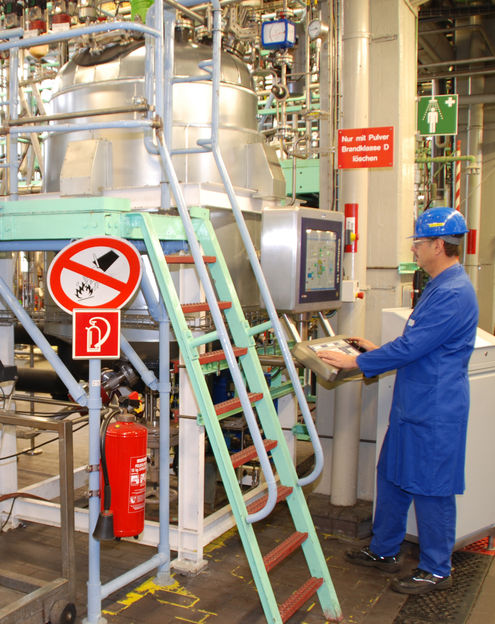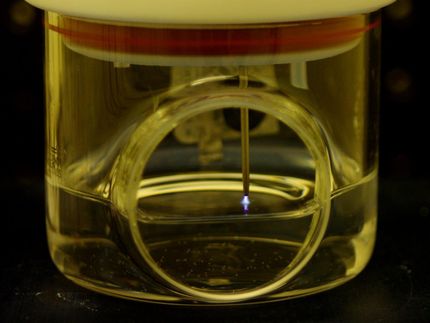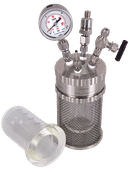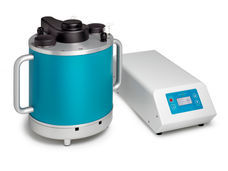AllessaSyntec tells Success Story after First Major Project in its New Low-Temperature Reactor
Managing Director Dr. Wisser: „With cutting edge technology we are successful in difficult times!“
Advertisement
The first major large-scale project of a multi-step synthesis of a pharmaceutical intermediate in the new 1000-liter-low-temperature reactor has recently been finished at the AllessaSyntec GmbH & Co. KG in Frankfurt-Höchst. “We have proven that the exclusive synthesis of high-value products at a technical scale can be offered faster and with high quality in the new, larger special reactor,“ declared Managing Director Dr. Thomas Wisser happily.

With the new 1000 liter low-temperature reactor the synthesis service provider AllessaSyntec expanded its capacities significantly. The first large-scale project in this equipment has just been completed successfully.
C. Steidl
“In the current challenging economic times we benefit from the crisis-stable pharma business and manufacture many intermediates for active pharmaceutical ingredients (API),“ explained Wisser and added: “But even this is a highly competitive field.“ With the new investment, AllessaSyntec meets the increased demand for complex organic boronic acids. The 1000 liter reactor can be operated at -100 °C and keeps this temperature even during strongly exothermic reactions. These for technical syntheses extremely low temperatures are achieved by a heat transfer medium that is cooled down by liquid nitrogen, which holds a temperature of -196 °C.
Following the low-temperature reaction, the vessel can be heated up for further reaction steps without time delay to a temperature of up to +200 °C. This allows exact synthesis conditions and an extended range of use. Furthermore, it improves the yield and purity of the products. Apart from the synthesis of intermediates for APIs, the application areas of the low-temperature reactor are the manufacturing of electronic materials and organometallic catalysts e. g. for the plastics industry.
„This investment strengthens our core business: The fast transfer of new products from the laboratory to technical scale and the manufacturing of high-value products in the scale from several tens of kilograms up to 50 tons,“ stated Thomas Wisser. The first low-temperature reactor with a capacity of 100 liters was installed 1993, when this unit was still part of the central research department of the Hoechst AG. That year this plant was the first worldwide to manufacture organometallic compounds on a technical scale. No other company benefits from a similar long-lasting experience and corresponding know-how. In the year 2000 an additional 500-liter-reactor was put in service. “With the new 1000-liter-reactor we are consequently expanding our capacities even further,“ emphasized Dr. Christoph Naumann, Director Operations.
Dr. Steffen Partzsch, Director Marketing & Sales, regards the increased capacity for low-temperature syntheses as a stabilizing factor for the company in the current economic crisis. “With these special syntheses we can compensate the drop in orders in the field of products for the automotive industry. This certainly helps to bridge these rather difficult times.“
AllessaSyntec's second key technology is the high-pressure synthesis at up to 200 bar: Carbonylations, air oxidations and special hydrogenations are performed in a separate plant within the industrial park in Frankfurt-Höchst. With these two technologies AllessaSyntec occupies a market niche, which has not been reached by many synthesis service providers so far. The technological advance is not only based on the equipment, but also on the decades-long experience of our roughly 70 employees. “In complex multi-step organic syntheses our staff combines these modern technologies with the whole range of classical organic chemistry,“ concluded Steffen Partzsch. For this purpose the company owns 80 reactors with volumes ranging from 100 to 5000 liters with various materials of construction.
Other news from the department manufacturing
These products might interest you
Most read news
More news from our other portals
See the theme worlds for related content
Topic world Synthesis
Chemical synthesis is at the heart of modern chemistry and enables the targeted production of molecules with specific properties. By combining starting materials in defined reaction conditions, chemists can create a wide range of compounds, from simple molecules to complex active ingredients.

Topic world Synthesis
Chemical synthesis is at the heart of modern chemistry and enables the targeted production of molecules with specific properties. By combining starting materials in defined reaction conditions, chemists can create a wide range of compounds, from simple molecules to complex active ingredients.


































































